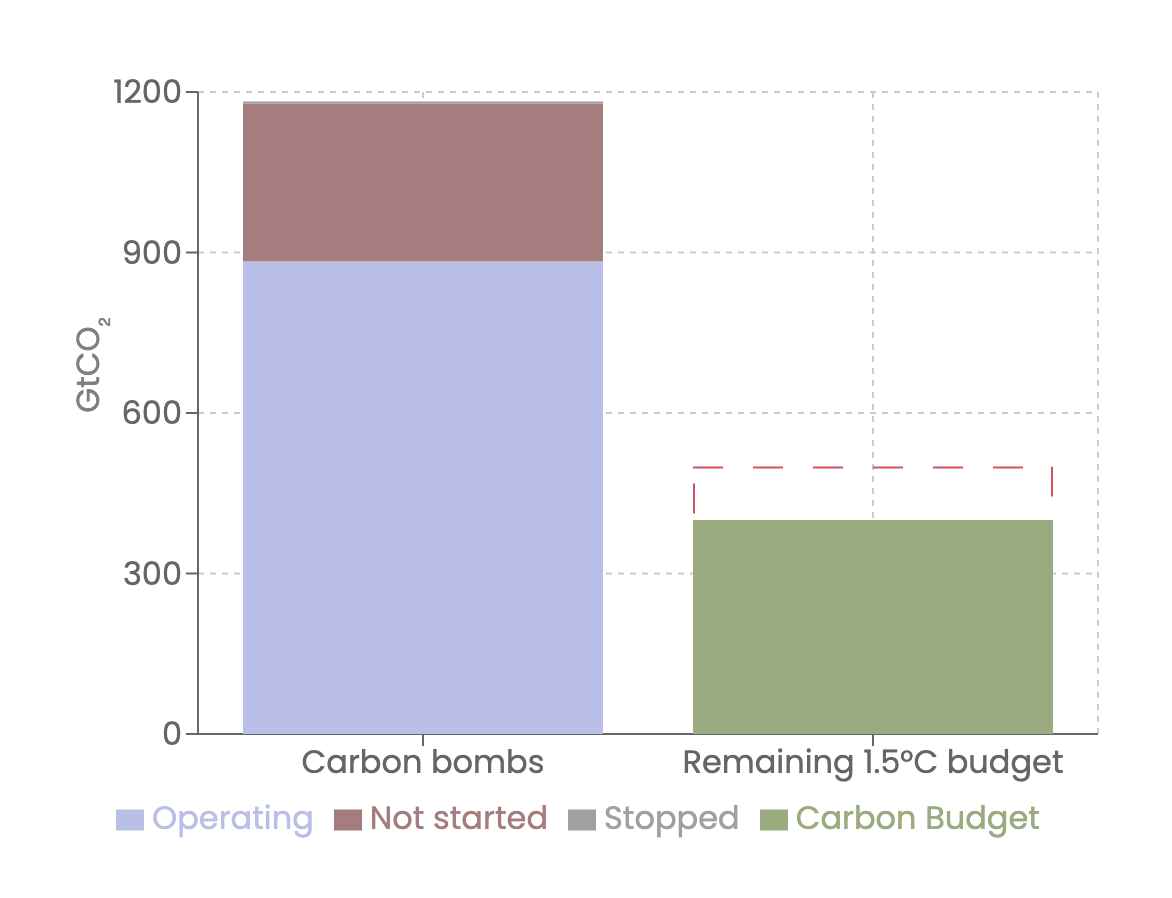CarbonBombs.org sheds light on banks' and companies' links with the world's 425 largest fossil fuel extraction projects
Lou Welgryn,
Co-President of Data for Good and Co-Founder of éclaircies,
+33 6 46 47 61 87
Oriane Wegner,
Co-Founder of éclaircies,
+33 6 59 57 32 89

Lou Welgryn,
Co-President of Data for Good and Co-Founder of éclaircies,
+33 6 46 47 61 87
Oriane Wegner,
Co-Founder of éclaircies,
+33 6 59 57 32 89
Thanks to citizen work analyzing public data, CarbonBombs.org displays on an open-source platform of the world's 425 largest fossil energy extraction projects (oil, gas and/or coal) - the potential combustion of each project could generate more than 1 billion tonnes of CO₂ (1 Gt of CO₂). This data is also aggregated by country, company, and bank to highlight the roles of different actors in the deployment of these projects. This analysis is based on three public databases, built respectively by researcher Dr. Kjell Kühne of the Leave it in the Ground Initiative (LINGO), the Global Energy Monitor organization, and the NGO consortium Banking on Climate Chaos.
"We thought of this platform as a tool easily accessible to democratize the orders of magnitude and the players involved in these carbon bombs. A gateway to awaken the curiosity of citizens, to make them want to get involved and deepen their understanding of these issues" - Lou Welgryn and Oriane Wegner, project leads.
A race against time
While scientists and experts have been warning for several years that the combustion of oil, gas, and coal is the major driver of climate disruption, new extraction projects continue to emerge. 40% of the identified carbon bombs, or 169 projects, had not yet started extraction in 2020, and at least 20 new projects have started since. It is a race against time to halt the expansion of new fossil extraction projects and gradually phase out those currently in operation. One month before COP 28, this platform highlights the importance of a coordinated global exit from fossil fuels.
"Just a few weeks ahead of COP 28, this platform underlines the importance of a rapid exit from fossil fuels coordinated on an international scale. It's a race against time to stop the deployment of new fossil extraction projects, and gradually close those currently in operation." - Lou Welgryn and Oriane Wegner, project leads
“Defusing carbon bombs is the most urgent task to stop making the climate emergency worse. As long as talking about specific fossil fuel projects is out of scope of the UN climate talks, other players have to stand up and stop these projects. This new tool allows anyone who cares about the climate to identify where these projects are and which companies and banks are still rushing us full speed into climate breakdown.” - Dr. Kjell Kühne
Projects defying international environmental objectives

To meet the goals of the Paris Climate Agreement and keep global warming below 1.5°C, cumulative global emissions must not exceed 400 to 500 billion tonnes of CO₂ (IPCC, AR6 report, 2023). However, the cumulative emissions from these 425 carbon bombs alone consume more than twice this carbon budget, definitively ruling out the possibility of limiting global warming to 1.5°C.
This observation is supported by scientists and experts. The International Energy Agency stated that “no investment in new fossil fuel supply projects, and no further final investment decisions for new unabated coal plants” should be made after 2021 to limit global warming to +1.5°C compared to the pre-industrial era.
Financing, a key challenge to accelerate the exit from fossil fuels
CarbonBombs.org also emphasizes the significant role of banks in the realization of these projects. There are several ways how banks support new fossil fuel projects:
-
Corporate financing: a bank provides financial services to an oil and gas company, and that company develops a fossil project with these general-purpose funds.
-
Project financing: a bank provides targeted financial services (loans, bond issuance) for a specific fossil project.
While some banks have committed to no longer directly finance new oil or gas projects, project financing actually represents a very small portion of all the funding allocated to the fossil industry compared to corporate financing, according to NGO Reclaim Finance. By continuing to provide unconditional funding to oil and gas companies involved in current or future carbon bombs, banks also play a major role in fueling the climate emergency.
About Data For Good
Data For Good is a French non-profit organization founded in 2014, bringing together over 4,000 experts from the tech sector who aim to support nonprofit organizations, NGOs, and government agencies. They work on open-source projects and provide support for numerous social, societal, and environmental initiatives each year.
About éclaircies
éclaircies is a collective of experts in ecology, energy, and climate issues who contribute to the production of expertise on ecological transition topics for the public good. Éclaircies undertakes open-source projects to enhance public understanding of ecological issues and equip various stakeholders (individuals, government, businesses, media) with the tools to act on the key drivers of transition.
